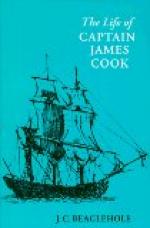Running closely along the coast, they hauled round Cape Colville into “the Entrance of a Straight, Bay or River,” and anchored for the night, and in the morning they stood on along the east side. Canoes came off, and from the behaviour of the occupants, some of whom came on board at the first invitation, it was judged that favourable accounts had been heard of the ship. After running about 5 leagues the water shoaled to about 6 fathoms, and the ship anchored, and boats were sent out to sound. No great increase of depth being found, the pinnace and long-boat went up a river about 9 miles away, and on account of a fancied resemblance named it the Thames. They landed at a village near the mouth, being well received, but desiring to take advantage of the flood-tide which ran “as strong as it does in the River Thames below bridge,” they made no stay; they went up about 14 miles, and then, finding little alteration in the appearance of the country, landed to inspect some large trees of a kind they had previously noticed. One was carefully measured, and was found to be 19 feet 6 inches girth at 6 feet from the ground, and, by means of Cook’s quadrant, 89 feet to the lowest branch. It was perfectly straight, and tapered very slightly, and some were seen that were even larger. This was the Black Pine; to the Maoris, Matoi, and to the naturalist, Podocarpus.
On the way down the river their friends of the morning came out and “traffick’d with us in the most friendly manner imaginable, until they had disposed of the few trifles they had.” When the boats got outside they had to anchor, as a strong tide and breeze were against them, and they did not reach the ship till next morning, when the breeze had increased to a gale, and topgallant yards had to be struck. When the wind dropped, what was left was against them, and the Endeavour would only go with the tide, so Cook took a run ashore to the west side of the bay, but saw nothing of interest, and concluded it was but sparsely inhabited. Whilst he was away natives went off to trade and behaved remarkably well, with the exception of one man who was caught making off with the half-hour glass, so Mr. Hicks had him triced up, and he was given a dozen lashes. When it was explained to his friends why this was done, they expressed their approval, and on his release an old man gave him another thrashing.
The weather now became very unsettled, and they were not able to keep as near the coast as they desired, but on 26th November some cultivated spots were seen, and several canoes came off.
“Some of the natives ventur’d on board; to two, who appeared to be chiefs, I gave presents. After these were gone out of the ship, the others became so Troublesome that in order to get rid of them, we were at the expense of two or three Musquet Balls and one 4 pound shott, but as no harm was intended them, none they received, unless they happened to overheat themselves in pulling ashore.”




